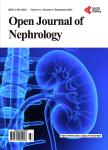Quality of Life of Chronic Kidney Disease Patients in the Republic of the Congo
Quality of Life of Chronic Kidney Disease Patients in the Republic of the Congo作者机构:Department of Nephrology University Hospital of Brazzaville Brazzaville Republic of the Congo Faculty of Heath Sciences University Marien Ngouabi Brazzaville Republic of the Congo Department of Urology University Hospital of Brazzaville Brazzaville Republic of the Congo Department of Gastroenterology University Hospital of Brazzaville Brazzaville Republic of the Congo
出 版 物:《Open Journal of Nephrology》 (肾脏病(英文))
年 卷 期:2021年第11卷第4期
页 面:495-505页
学科分类:1002[医学-临床医学] 100210[医学-外科学(含:普外、骨外、泌尿外、胸心外、神外、整形、烧伤、野战外)] 10[医学]
主 题:Chronic Kidney Disease Quality of Life KDQOL
摘 要:Background: Chronic kidney disease could impair the quality of life of patients regardless of the stage of the disease. So far, there is no data on this subject in the Congolese population. The objective of this study was to assess the quality of life of patients with chronic kidney disease in Congo. Patients and methods: We conducted a cross-sectional, descriptive study of 91 patients followed in the department of nephrology and in dialysis centers in Brazzaville, Pointe-Noire and Oyo from July 1st to November 30th, 2020, i.e. five months. We used the Kidney disease quality of life short form health survey score (KDQOL-SF 36) to assess the quality of life of patients and a questionnaire was used to determine socio-demographic, clinical and therapeutic features. Data analysis was done on SPSS 2.2 software. Result: The average age was 51.9 ± 15 years. The sex ratio M/F was 2.03. The average time of patient follow-up was 15 months;90% of them had hypertension. The overall average score of specific dimensions was 52 ± 18;disease burden was the dimension most affected;that of the generic dimensions was 34 ± 25 with the limitation of physical activity dimension being the most affected. No patient had received psychological follow-up. Conclusion: This study indicates the value of a systematic assessment of the quality of life of patients with chronic kidney disease as well as the need for assistance for these patients in different areas of their life.



